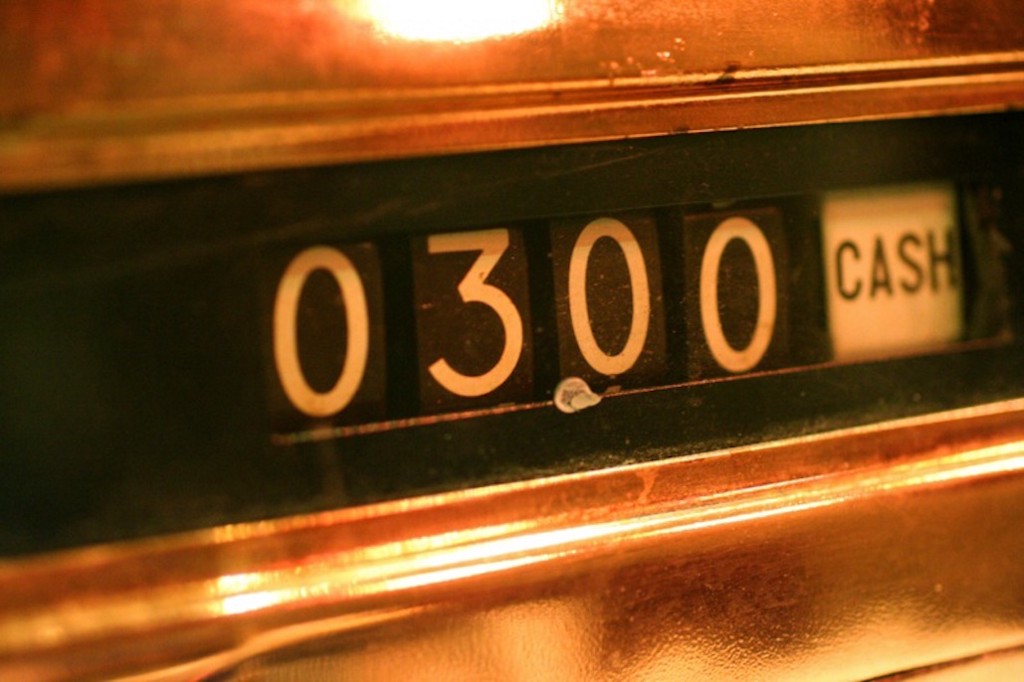Paying Via App, Bitcoin, and Microchip
BuzzFeed’s Charlie Warzel becomes the first person to pay for a meal with a microchip embedded in his hand.

When you get some time—because this is a long and worthwhile read—check out Charlie Warzel’s BuzzFeed article on our cashless future:
What The Mark Of The Beast Taught Me About The Future Of Money
Warzel spends a month without cash, which is the kind of thing we might dismiss as “yeah, I pay for everything with debit and credit too,” except in this case cash includes our debit cards, our credit cards, and anything that pulls money directly from our bank accounts without the aid of an online third party.
When Warzel goes without cash, he pays via Venmo, PayPal, Apple Pay, Bitcoin, Dogecoin, and microchip embedded in hand.
(Technically, he can’t get anyone to accept Dogecoin. But he tries.)
Here are a few of the best quotes:
On the real reason why Starbucks lets you buy coffee with an app:
But the future of mobile retail is assuredly dystopian. Just ask Andy O’Dell, who works for Clutch, a marketing company that helps with consumer loyalty programs and deals with these kinds of mobile purchasing apps. “Apple Pay and the Starbucks payment app have nothing to do with actual payments,” he told me. “The power of payments and the future of these programs is in the data they generate.”
Imagine this future: Every day you go to Starbucks before work because it’s right near your house. You use the app, and to ensure your reliable patronage, Starbucks coughs up a loyalty reward, giving you a free cup of coffee every 15 visits. Great deal, you say! O’Dell disagrees. According to him, Starbucks is just hurting its margins by giving you something you’d already be buying. The real trick, he argued, is changing your behavior. He offers a new scenario where this time, instead of a free coffee every 15 visits, you get a free danish — which you try and then realize it goes great with coffee. So you start buying a danish once a week, then maybe twice a week, until it starts to feel like it was your idea all along.
In that case, O’Dell said, Starbucks has “changed my behavior and captured more share of my wallet, and they’ve also given me more of what I want.”
On how people buy stuff with Bitcoin:
To buy anything immediately out in the physical world, I had to use bitcoin to buy gift cards and then redeem them at the store for groceries, meals, and anything else. When I ran out of toilet paper, I loaded up Gyft, a digital gift card site, and purchased a $15 CVS card, which I then redeemed for Cottonelle as the store opened — all told, a 45-minute ordeal. Splitting the bill was impossible without a friend willing to set up their own bitcoin wallet, and sending money through bitcoin’s blockchain technology felt almost purposefully intimidating, with long, wonky wallet addresses, exchanges, and codes.
On the Bible predicting the day we’d embed microchips in our hands:
My piercer, Chai, and I retired to the backroom where my skewering would take place. “So now I’m going to tell you something you probably didn’t consider before,” he said, furrowing his brow. “People — very conservative right-wing Christian types — might come after you for this. They see it as the Mark of the Beast. I just want you to be prepared.” I nodded like this is something I had expected to hear.
This comes from the Book of Revelation: “And he causeth all, both small and great, rich and poor, free and bond to receive a mark on their right hand, or on their foreheads; and that no man might buy or sell, save he that had the mark, or the name of the beast or the number of his name.”
We’re not yet to the point where no man might buy or sell save that he had a microchip embedded in his hand—Warzel is literally the first person to pay for a meal by letting the restaurant scan his hand with their smartphone until Venmo read the chip and automatically deducted the full cost of the meal plus a 20 percent tip—but we are getting closer to the day when more people have that option.
The one question Warzel doesn’t really answer, though, is why? He addresses it briefly by noting that credit and debit cards already do what they do really well, and paying for stuff isn’t a problem we need to solve, but I’m still stuck on why you’d let Square or PayPal take a cut of the transaction (I mean, I know that credit card companies take a cut too, but I’d like to see some comparative figures here), or why you’d let the Starbucks app siphon off your data, when you could just swipe a debit card.
So I’ll turn that question over to you. Read the article, share which payment apps you use in lieu of credit/debit, and let us know whether you are looking forward to the day in which we all carry the Microchip of the Beast in our hands.
Support The Billfold
The Billfold continues to exist thanks to support from our readers. Help us continue to do our work by making a monthly pledge on Patreon or a one-time-only contribution through PayPal.
Comments